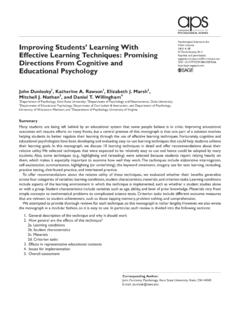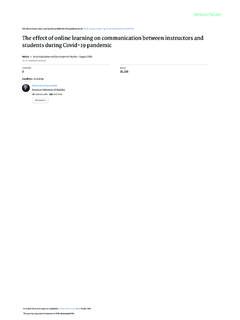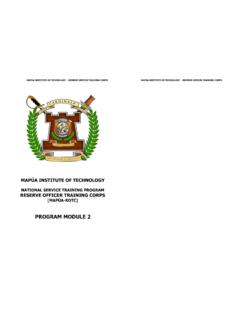Transcription of Teacher Quality and Student Achievment: Making the Most …
1 March 2008 Laura Goe, M. SticklerETSTQ Research & Policyupdatebrief877-322-8700 17th Street NW, Suite 500 Washington,DC 20036-4632 ContentsPageIntroduction .. 1 What Makes a Good Teacher ? .. 2 Teacher Qualifications .. 3 Teacher characteristics .. 6 Teacher Practices .. 7 Teacher Effectiveness.. 9 Policy Implications .. 10A Word of Caution .. 10 Translating Research Into Practice .. 12 Teacher Salaries and Pay Differentiation.. 15 Directions for Future Research .. 15 References .. 21 Most of us believe that good teaching matters. What smore, most of us think we know good teaching whenwe see it. However, while many studies attest thatsome teachers contribute more to their students academic growth than other teachers, research hasnot been very successful at identifying the specificteacher qualifications, characteristics , and classroompractices that are most likely to improve studentlearning.
2 Unfortunately, this is just the informationthat educational policymakers need lack of definitiveness does not necessarilymean that research studies on Teacher Quality havebeen poorly conducted. Findings in an area asbroadly defined as Teacher Quality are often difficultto interpret, given the many ways of identifying andmeasuring the qualifications, characteristics , andpractices that contribute to the concept of whatmakes a good Teacher . Differences in definitions,combined with differences in ways of measuringteacher effectiveness, can even producecontradictory findings about educational careful research is the appropriate tool fordetermining more precisely what it means to be an effective Teacher , these inherent complexitiesmake it difficult for stakeholders to draw usefulconclusions from the diverse an effort to pinpoint Teacher Quality variablesacross studies for which there is strong agreement,Goe (2007) recently undertook a research synthesisfor the National Comprehensive Center for TeacherQuality.
3 This particular synthesis which isavailable online ( ) examines dozens of research studies that link anumber of Teacher Quality variables to studentachievement, as measured by standardized many studies have been conducted on thevariables described in the following section, Goefocused only on studies in which authors tied theirfindings explicitly to Teacher Quality . Goe s analysisunearths many contradictory and weak conclusions,but the synthesis also identifies a few strong andconsistent predictors of Student achievement. ThisResearch and Policy Brief culls the associationsbetween Teacher Quality and Student achievementthat Goe identifies, with the goal of elucidatingtrends relevant to current educational Quality and Student AchievementIntroductionWhile many studies attest that some teachers contribute more to theirstudents academic growth than other teachers, research has not beenvery successful at identifying the specific Teacher qualifications, characteristics , and classroom practices that are most likely to improvestudent learning.
4 Unfortunately, this is just the information thateducational policymakers need most. 2 What Makes a Good Teacher ?Goe s (2007) examination of Teacher Quality focuseson four categories of Teacher Quality indicators Teacher qualifications, Teacher characteristics , Teacher practices, and Teacher effectiveness which,Goe determined, empirically capture the primaryvariables examined in research studies on teacherquality published between 2000 and 2007. (Someearlier landmark studies are occasionally alsoincluded in later discussions of specific teacherquality indicators.) Largely due to the highlyqualified Teacher provisions of the No Child LeftBehind (NCLB) Act, these four categories also alignwith the current national emphasis on certificationand licensure, experience, and subject-matterknowledge. In addition, the four categoriessummarize the ways that Teacher Quality iscommonly defined for policy purposes, and theyare frequently linked to hiring and career-ladderdecision Making .
5 Table 1 lists and defines thecategories and provides examples of the indicatorsencapsulated by identify consistent findings for variables culledusing the categories, Goe first employed a protocolto summarize the variables on which each studyfocused, then evaluated these for statisticallysignificant positive or negative findings as well asfor the absence of significant findings. Any concernabout how a study was conducted was also notedbecause this could provide useful information aboutthe generalizability of the study s findings. Thecollection of summaries was then sorted by findingto determine whether a preponderance of evidencepoints to any statistically meaningful measures ofteacher Quality as well as to determine whether theresearch as a whole reveals any telling differencesbetween variables. Findings for each category arediscussed in the sections that 1.
6 Four Lenses for Examining Teacher QualityTeacher qualificationsCredentials,knowledge, and experiences that teachers bring with them when they enterthe classroom, such as:Coursework, grades, subject-matter education, degrees, test scores, experience,certification(s),and evidence of participation in continued learning ( , internships,induction, supplemental training, and professional development) Teacher characteristicsAttitudes and attributes that teachers bring with them when they enter the classroom,such as:Expectations for students ,collegiality or a collaborative nature, race, and genderTeacher practicesClassroom practices teachers employ that is, the ways in which teachers interact withstudents and the teaching strategies they use to accomplish specific teaching tasks, such as:Aligning instruction with assessment, communicating clear learning objectives andexpectations for Student performance, providing intellectual challenge, allowing studentsto explain what they are learning, using formative assessment to understand what andthe degree to which students are actually learning, offering active learning experiences,subscribing to cohesive sets of best teaching practicesTeacher effectivenessA value-added assessment of the degree to which teachers who are already in theclassroom contribute to their students learning.
7 As indicated by higher-than-predictedincreases in Student achievement scoresCategoryDefinition and example indicators Teacher Quality and Student AchievementTeacher QualificationsTeacher qualifications are particularly necessary for regulating entry into the classroom whenperformance and outcome data are not yet available,as is the case with new teachers. Teacherqualifications are also commonly used as indicatorsof Teacher Quality because of the relative ease andcost-effectiveness of collecting this data, which canoften be found in public records maintained bystates and districts. But are Teacher qualificationsalso effective at identifying teachers who improvetheir students achievement?The simple answer is yes, to a types of Teacher qualifications areconsistently associated with increased studentachievement in particular subject areas mostnotably in mathematics, where research efforts seem to be concentrated.
8 In particular, Goe (2007)discerned the following two key teacherqualification variables that, across studies, areconsistently shown to produce strong, positiveeffects on Student learning: Teachers knowledge of mathematics mattersfor Student learning in mathematics at all schoollevels,but particularly at the secondary measured by mathematics coursetaking, certification, or degree, it appears thatteachers with stronger mathematics knowledgeproduce better Student achievement inmathematics compared with less knowledgeable teachers. Teachers level of experiencematters but only for the first fiveyears of teaching. During these firstfew years, teachers appear to gainincrementally in their contributionto Student learning. After fiveyears,however, thecontribution of experienceto Student learningappears to level noteworthy findings about teacherqualifications that Goe (2007) observed follow,by Teacher qualification association of thisspecific Teacher qualification with higher studentachievement varies by grade level.
9 Strongercorrelations exist between the achievement ofsecondary school students and their Teacher ssubject-area expertise (as reflected by variouscredentials) than exist between the success ofyounger students and their Teacher s subjectknowledge. In particular, several studies indicatethat Teacher completion of an undergraduate orgraduate major in mathematics is associated withhigher Student achievement in high school andmiddle school (Aaronson, Barrow, & Sanders, 2003;Frome, Lasater, & Cooney, 2005; Goldhaber &Brewer, 2000; Monk, 1994; Wenglinsky, 2000,2002). Monk (1994) and Wenglinsky (2000)identify a similar trend in effects associated with a Teacher s possession of an advanced degree arestrikingly counterintuitive, especially given thesalary incentives offered to encourage teachers to pursue graduate degrees.
10 Not only do recentempirical studies notfind a substantial benefit forstudents of teachers with advanced degrees, but themajority of such studiesalso indicate thatteachers with3master s degrees and beyond may negativelyinfluence their students achievement (Clotfelter,Ladd, & Vigdor, 2006; Monk, 1994; Rowan,Correnti, & Miller, 2002). Betts, Zau, and Rice(2003) find marginal benefits for middle schoolmathematics achievement when teachers holdmaster s degrees, but this effect is not practicallysignificant. Hanushek, Kain, O Brien, and Rivkin(2005) find no association between teachers holdingmaster s degrees and fourth- through eighth-gradestudents mathematics test score gains in Teacher test scores are often usedas an indicator of Teacher Quality ,the results of threerecent empirical investigations are somewhat mixedon the subject.














